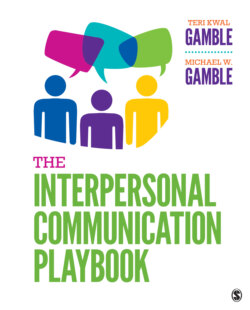Читать книгу The Interpersonal Communication Playbook - Teri Kwal Gamble - Страница 129
На сайте Литреса книга снята с продажи.
Age and Person Perception
ОглавлениеThroughout the life span, we continually change age-group memberships. How old we are at any point in time influences our perceptions of others.39 When perceiving an elderly person, younger people may engage in category-based processing. In contrast, if the perceiver is also older and views the target individual as similar, in age, he or she would probably rely on person-based processing, rather than on stereotypic category-based processing. Person-based processing reduces the influence of group attitudes on our perceptual judgments. Because we are likely to be more familiar with people in our own age group, we are motivated to use person-based processing when forming impressions of members of that group.40
Try This: Age Wise
Imagine yourself in the following situation. You work on campus in one of the chemistry labs from 6:00 p.m. until midnight. It is late in your shift, and you’re alone. You’re a bit more nervous than usual because there’s been an increase in campus crime and students have been warned to travel in pairs. You’re relieved when midnight comes, and you can close the lab and go home. As you are about to lock the door to the lab, you hear someone yell, “Wait! Don’t lock the door!” A person runs down the hall toward you and pleads with you to be let in so that work can be completed on an experiment. The person isn’t carrying any student ID but tells you that it was left in a car. You don’t recognize the individual.
Do you trust what you are being told? Do you let the person in? How would you respond if the person were your age? What if the person was significantly older than you? Would your answer differ if it was a man or a woman at the door? What if the individual was Asian? Latino? Muslim? Dressed shabbily? Wearing designer clothes? Explain your answers.
Young people have the highest level of anxiety about aging.41 As a result, younger people tend to place older adults into a number of different stereotypes and are likely to perceive them more negatively than they view young and middle-aged adults. Older people, in contrast, have more positive attitudes about their own aging process and perceive other older adults as exhibiting more instrumentality and autonomy. While this may be due to an in-group favoritism effect, the same effect may explain why younger people rate characteristics of people their own age more favorably than do older people.
Gender also affects attitudes toward age. Young women who attribute any negative attitudes toward older people to their own fear of aging tend to stereotype older people less than do other women. In contrast, young men who acknowledge their own fears about aging tend to stereotype older people more than do other men. This may be attributed to the fact that men and women have different mental representations for aging.42
